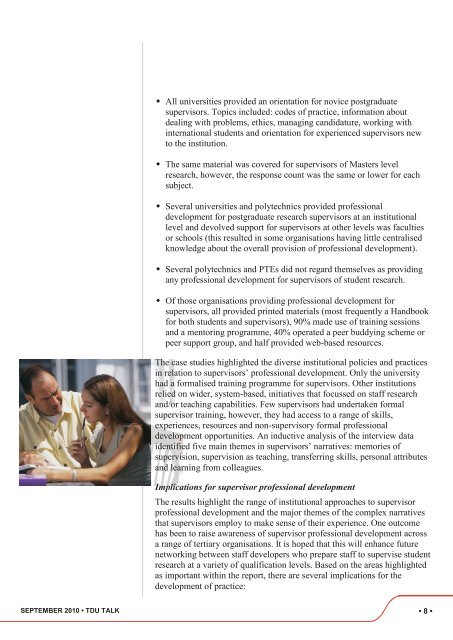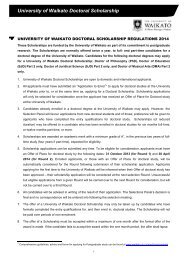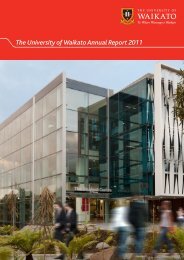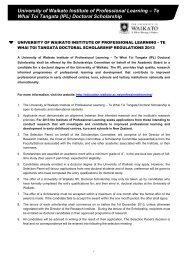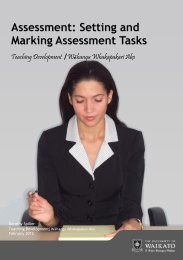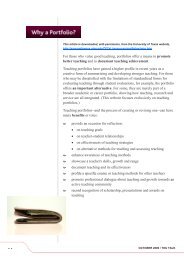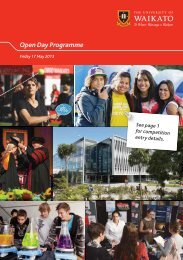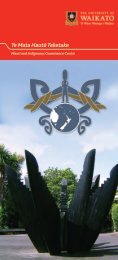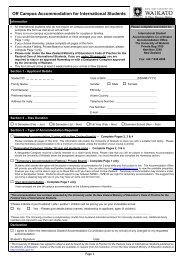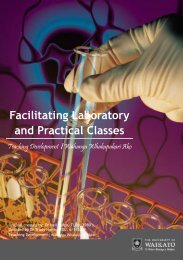Postgraduate Supervision - The University of Waikato
Postgraduate Supervision - The University of Waikato
Postgraduate Supervision - The University of Waikato
- No tags were found...
Create successful ePaper yourself
Turn your PDF publications into a flip-book with our unique Google optimized e-Paper software.
• All universities provided an orientation for novice postgraduatesupervisors. Topics included: codes <strong>of</strong> practice, information aboutdealing with problems, ethics, managing candidature, working withinternational students and orientation for experienced supervisors newto the institution.• <strong>The</strong> same material was covered for supervisors <strong>of</strong> Masters levelresearch, however, the response count was the same or lower for eachsubject.• Several universities and polytechnics provided pr<strong>of</strong>essionaldevelopment for postgraduate research supervisors at an institutionallevel and devolved support for supervisors at other levels was facultiesor schools (this resulted in some organisations having little centralisedknowledge about the overall provision <strong>of</strong> pr<strong>of</strong>essional development).• Several polytechnics and PTEs did not regard themselves as providingany pr<strong>of</strong>essional development for supervisors <strong>of</strong> student research.• Of those organisations providing pr<strong>of</strong>essional development forsupervisors, all provided printed materials (most frequently a Handbookfor both students and supervisors), 90% made use <strong>of</strong> training sessionsand a mentoring programme, 40% operated a peer buddying scheme orpeer support group, and half provided web-based resources.<strong>The</strong> case studies highlighted the diverse institutional policies and practicesin relation to supervisors‘ pr<strong>of</strong>essional development. Only the universityhad a formalised training programme for supervisors. Other institutionsrelied on wider, system-based, initiatives that focussed on staff researchand/or teaching capabilities. Few supervisors had undertaken formalsupervisor training, however, they had access to a range <strong>of</strong> skills,experiences, resources and non-supervisory formal pr<strong>of</strong>essionaldevelopment opportunities. An inductive analysis <strong>of</strong> the interview dataidentified five main themes in supervisors‘ narratives: memories <strong>of</strong>supervision, supervision as teaching, transferring skills, personal attributesand learning from colleagues.Implications for supervisor pr<strong>of</strong>essional development<strong>The</strong> results highlight the range <strong>of</strong> institutional approaches to supervisorpr<strong>of</strong>essional development and the major themes <strong>of</strong> the complex narrativesthat supervisors employ to make sense <strong>of</strong> their experience. One outcomehas been to raise awareness <strong>of</strong> supervisor pr<strong>of</strong>essional development acrossa range <strong>of</strong> tertiary organisations. It is hoped that this will enhance futurenetworking between staff developers who prepare staff to supervise studentresearch at a variety <strong>of</strong> qualification levels. Based on the areas highlightedas important within the report, there are several implications for thedevelopment <strong>of</strong> practice:SEPTEMBER 2010 • TDU TALK• 8 •


